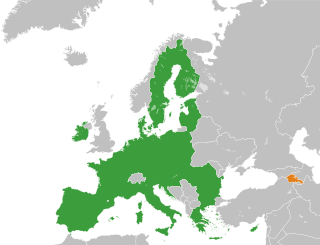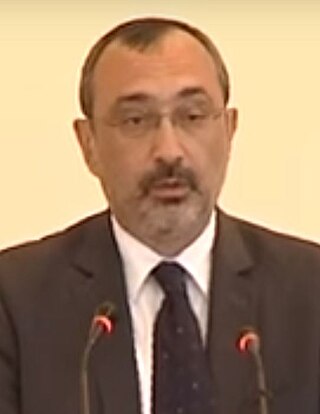Timeline of events
On 27 December 2022, Armenian Foreign Minister, Ararat Mirzoyan wrote to the EU's High Representative of the Union for Foreign Affairs and Security Policy and invited the European Union to deploy a civilian CSDP mission in the country. [20] The mission was subsequently approved by the Council of the European Union on 23 January 2023 with an initial period of deployment of two years. [1] [21]
On 23 January 2023, Prime Minister of Armenia Nikol Pashinyan met with EU Special Representative for the South Caucasus, Toivo Klaar and the EU Ambassador to Armenia Andrea Wiktorin to discuss the deployment of EUMA, expanding Armenia–EU cooperation, and issues concerning the blockade of Artsakh. [22]
On 27 January 2023, the first high-level Armenia-EU Political and Security Dialogue meeting took place in Yerevan. Deputy Foreign Minister of Armenia Vahe Gevorgyan and Deputy Secretary General of the European External Action Service Enrique Mora discussed increasing political ties and further developing Armenia–European Union relations. The parties discussed issues facing Armenia and security challenges across Europe, the deployment of EUMA, the need to establish a stable and peaceful South Caucasus region, and the process of normalization of Armenia–Turkey relations. Enrique Mora stated, "The first ever Armenia-EU Political and Security Dialogue launched today demonstrates our mutual interest in enhancing cooperation on foreign and security policy issues, and readiness to work together for the benefit of peace, security and stability." [23]
On 30 January 2023, Markus Ritter, an officer of the German Federal Police and former Head of the European Union Advisory Mission in Iraq, was named as the Head of Mission of EUMA. It was also announced that the headquarters of the mission will be in Yeghegnadzor. [24] [25] Meanwhile, Stefano Tomat, the EEAS Managing Director of the Civilian Planning and Conduct Capability (CPCC), will serve as the Civilian Operations Commander. [26]
On 9 February 2023, French MEP Nathalie Loiseau confirmed that members of the French National Gendarmerie will be among those deployed to Armenia as part of the EU mission. Loiseau stated, "the mission will start on February 20, and I will be in Armenia on that day. I welcome Armenia's support and cooperation with the mission. The mission will be our eyes and ears on the ground, and its presence should deter new attacks." [27]
On 17 March 2023, during a meeting of the Standing Committee on European Integration, Armenian deputy foreign minister Paruyr Hovhannisyan stated that relations between Armenia and EU member states have been increasing over the past year and are more dynamic. The minister applauded the efforts of the EU Mission and stated that the EU has significantly contributed to the security and stabilization of the region. [28]
In April 2023, the mission head Markus Ritter stated, "Many Armenians believe there'll be a spring offensive by Azerbaijan. If this doesn't happen, our mission is already a success." [29]
On 4 May 2023, Prime Minister Nikol Pashinyan stated, "Armenia is interested in deepening cooperation with the European Union" and that the EU mission would help "maintain international attention towards our region". [30]
Between 19 and 21 June 2023, delegates of the European Parliament Subcommittee on Security and Defence (SEDE) travelled to Armenia. Delegates conducted a joint patrol with EUMA personnel near the Lachin corridor, and met with representatives of the Armenian parliament and with EU member states ambassadors. [31] [32] SEDE delegates confirmed that the European Parliament fully supports sending an international fact-finding mission to the Lachin corridor in order to protect the rights and interests of the people of Nagorno-Karabakh and to end Azerbaijan's illegal blockade. [33]
On 22 June 2023, Vaqif Sadıqov, Azerbaijan's ambassador to the EU, wrote a tweet saying that EUMA monitors should stay away from the Armenia-Azerbaijan border if they do not want to get shot by Azerbaijani snipers. Although Sadıqov defended his comments, EU officials responded by saying they were looking into the incident and reported that they had summoned the Azeri ambassador. [34]
On 19 July 2023, the EU's Political and Security Committee approved Canada's proposal to contribute to EUMA. [35] The Committee noted that Canada's involvement to the mission is a "significant event". [36]
On 14 August 2023, EUMA said that one of its patrols was fired at near the Armenia–Azerbaijan border; Azerbaijan denied responsibility for the event. [13]
On 3 September 2023, during an interview, prime minister Nikol Pashinyan stated that it was a strategic mistake for Armenia to solely rely on Russia to guarantee its security. Pashinyan stated, "Moscow has been unable to deliver and is in the process of winding down its role in the wider South Caucasus region" and "the Russian Federation cannot meet Armenia's security needs. This example should demonstrate to us that dependence on just one partner in security matters is a strategic mistake." Pashinyan accused Russian peacekeepers deployed to uphold the ceasefire deal of failing to do their job. Pashinyan confirmed that Armenia is trying to diversify its security arrangements, most notably with the European Union and the United States. [37]
On 3 October 2023, following the Azerbaijani offensive in Nagorno-Karabakh and subsequent flight of Nagorno-Karabakh Armenians, French Foreign Minister Catherine Colonna asked the EU's chief diplomat, Josep Borrell, to expand the EU mission in Armenia and proposed including Armenia in an EU peace mechanism similar to that implemented by the bloc in Moldova. [38]
On 17 October 2023, Armenian prime minister Nikol Pashinyan addressed the European Parliament. Pashinyan stated, "since February of this year, the long-term civilian mission of the European Union has been operating in Armenia, which monitors the security situation along the state border of Armenia with Azerbaijan. This is a key event through which the European Union got involved in Armenia's security agenda for the first time." [39]
On 20 October 2023, it was announced that the EU would be taking steps to expand the mission and increase the amount of monitors based in Armenia. [40] On 23 October 2023, the Chairman of the German Bundestag Foreign Relations Committee, Michael Roth stated, "I strongly support the EU expanding its civilian mission in Armenia for the benefit of Armenia, the safety and security of the Armenian people." [41]
On 13 November 2023, EU Foreign Ministers approved a proposal to expand EUMA operations. Josep Borrell stated, "We decided to beef up our mission in Armenia… with more patrols in the sensitive areas of the border" and "we will explore possible support to Armenia under the European Peace Facility and an option for visa liberalization for Armenia." [42]
On 29 February 2024, the European Parliament adopted a report calling on the EU to immediately apply sanctions against Azerbaijan and on Azeri president Ilham Aliyev. Additionally, it suggests suspending the import of oil and natural gas from Azerbaijan in the event of any military aggression against Armenia. The report also calls for the EU to become more actively engaged in the South Caucasus, to support the signing of a peace treaty between Armenia and Azerbaijan, and offering both countries the prospect of closer integration with the EU. The adopted report calls for the strengthening and extension of EUMA's mandate, and to deploy EU monitors along Armenia's border with Turkey. [43]
















